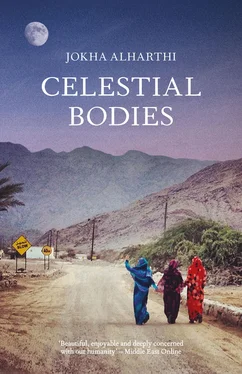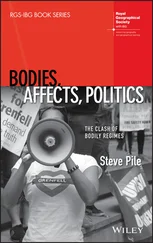Twice each day her daughter Shanna came in with lunch and dinner, from the home of Merchant Sulayman. She almost never opened her mouth in response to Masouda’s cries as she handed her mother the heaping plate and took the empty one. A neighbour woman might come by, earning herself a good deed by stopping sometimes beneath the barred window for a chat. The young boys from the village crept in periodically to relieve themselves at the foot of the wall or to threaten Masouda if she didn’t stop screaming so loudly.
Now and then Shanna showed up for an unexpected visit, looking in on her mother, filling the pitcher in the toilet. Exactly a fortnight into each month she gave her mother a bath, washed and plaited her hair, swept the place out and sprinkled water across the dirt courtyard.
I am Masouda! I am Masouda and I’m in here...
On some days the breeze was vigorous enough to budge the rusty metal door. It wasn’t Shanna or a neighbour woman or the boys, but without any lamp, how could Masouda know to stop shouting as long and as loud as she could?
I’m in heeeeere! I am Masouda...
Salim worries me. After his poor showing in the high school exams, one of the private colleges did give him a place but even that was difficult to secure. I’m not pleased with anything that boy does or who he is.
London says to me, Negative! You are just so negative, Dad! Soon she will really turn into a mature grown-up. Now that she can regain some peace of mind after her bad love affair, she’ll start a new page. How happy I feel when I see her smile, on her way to the hospital, pulling on her doctor’s coat. Praise be to God who has blessed humankind with the ability to forget!
As a little boy I got used to hearing Habib suddenly bark, Forgetting? Where is it, this forgetting? I never liked Habib, not at all. Whenever he saw me with Zarifa he gave me a shove. He knew I wouldn’t dare tell my father. Zarifa never defended me when it happened. I was very happy when Habib disappeared for good. His son Sanjar was no more than six when people started whispering that Habib had escaped. Habib’s ancient mother screamed and rolled herself madly in the sand and tore her clothes to shreds. She seemed to know, somehow, that he would never come back. But it didn’t surprise anyone to find him gone. He was always saying that he would go back to that land from which he’d been snatched away, back to his freedom, plundered by pirates and merchants. Some years later, someone said they’d caught a glimpse of him in the Baluch Café in Dubai — that was when every nation had their own café there — but others were certain he really had gone back to Makran, in Baluchistan, that he’d married and had children there. Still others said he had died of tuberculosis not long after escaping, and before the change in regime that brought with it a rush of new hospitals.
Zarifa didn’t shed one tear over him and I never heard her talk about him. Once when I was older I asked her why she didn’t try to find anything out about him. She answered with her favourite line. The proverb-maker says: Knowledge means pain, not knowing keeps me sane. But raising Sanjar, she couldn’t keep him ignorant. When he had grown up and had children, he emigrated to Kuwait. She didn’t roll in the sand or tear her clothes to rags, though. She waited eight years, until my father was dead, and then she went after her son. Very soon she was back, spitting and swearing at the viper whom her son had married. After that, I had no more news of her. I was completely preoccupied with the nosedive in the market, with real estate, with building the new house in Muscat, with London’s marriage and divorce, Salim’s studies and Muhammad’s illness, and all the worries of the world. Then I heard suddenly that Zarifa had died.
I went to my father’s funeral after he died in hospital. When my uncle died of a heart attack, and Zayd drowned in the flood, and Maneen was killed by a bullet, and Hafiza died of AIDS and Marwan killed himself with his father’s dagger, I went to their funerals, and I also attended funerals for my friends’ fathers and mothers, but I didn’t go to Zarifa’s. Simply, no one told me. She got ill without my knowing and she died and was buried and I still didn’t know.
I saw my father in my dreams, his eyes red from so much anger. He was brandishing a palm-fibre rope in my face as he asked me about her. Ahh, Habib! Your mother is very old, but she is still alive, even now. Where are you, and your shouts into my childish face? Forgetting? Where is this place called Forgetting?
The visitors are giving their full attention to the sweets and fruits. Zarifa pours out coffee for the women and doesn’t let a sentence go by without commenting on it. Laughter rises, voices mingle, repeating complaints about husbands and children, news of marriage, divorce, and recent childbirths, commentary on the startlingly bright fabrics flooding Hamdan’s shop, the televisions whose presence was no longer limited to the homes of Shaykh Said and Merchant Sulayman, or which mudbrick house had most recently been replaced by a cement-block rectangle. They had things to laugh about, and their hostess, Salima, smiled to show that she shared their good cheer.
Yesterday — and for the first time ever in her married life — Azzan had given her a gold ring that held an enormous blue stone. Everyone knew Salima despised gold and scorned any sort of adornment. What she had been obliged to buy as a bride she had kept in a locked steel box buried deep inside her large wooden wedding chest. She and Azzan had never exchanged gifts. He always gave her what she needed and he never asked her about household expenses: but gifts were another story! Salima felt uneasy about her husband’s impulsive offering.
As she disappeared into the kitchen to prepare more fruit, the muezzin’s wife and Judge Yusuf’s widow bent their heads together to whisper. Sister, what kind of man is Abdallah, allowing his daughter to have this odd name? Seems he doesn’t get to say a word about it, doesn’t his woman Mayya listen to him? If he had any balls, if he could make her listen, he would never have left it to her to name the girl for a city in the land of the Christians. London! Since when does anyone name his daughter after a place anyway?
Mayya eats dates alone in bed. Asma’s attempts to convince her mother that they should always eat together had fizzled. The prophetic hadiths she recited had no effect but to anger Muezzin-Wife, who accused her of deliberately attempting to revise the faith and corrupt it with evil innovations from books. None of this bothered Mayya. She wasn’t particularly concerned about food and whether she consumed it in others’ company or not. She did not understand how women could spend so much time eating and talking. She, on the other hand, was silently watching her little daughter make a tiny triangle with her lips, and open and close her eyes. London’s crying lessened and she began spending longer periods batting at the air with her hands and feet. Mayya loved watching her swatting at the air, but her mother insisted on swaddling the baby. Mayya had chosen the white swaddling herself from Ruwi Souq when she’d gone to Muscat to give birth. She also bought tiny white undershirts and two little yellow gowns that would suit either a boy or a girl perfectly well. She hid Khawla’s lipstick among her clothes, hoping her mother wouldn’t spot it.
She didn’t know what it was that worried her mother so much about Khawla. Mayya saw her as a gentle person, quick to sympathise with others, the prettiest and sweetest girl in al-Awafi. What was the problem if she insisted that her father buy her a ring and some gold bangles? She deserved them, and her father could afford it. Mayya was uncomfortable when her mother attacked Khawla for what seemed the most trivial of reasons. If her mother didn’t like jewellery, that was her business, but couldn’t she let Khawla alone? If only London would turn out as pretty as her aunt!
Читать дальше












